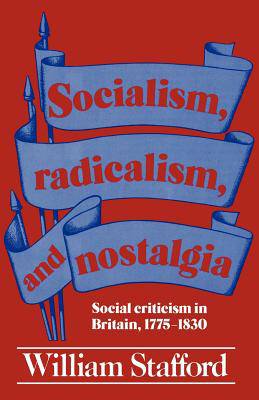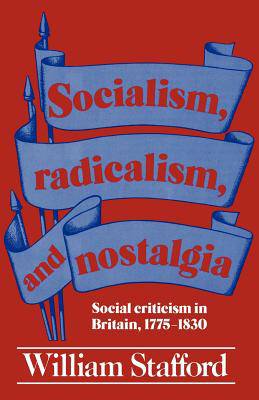
Door een staking bij bpost kan je online bestelling op dit moment iets langer onderweg zijn dan voorzien. Dringend iets nodig? Onze winkels ontvangen jou met open armen!
- Afhalen na 1 uur in een winkel met voorraad
- Gratis thuislevering in België vanaf € 30
- Ruim aanbod met 7 miljoen producten
Door een staking bij bpost kan je online bestelling op dit moment iets langer onderweg zijn dan voorzien. Dringend iets nodig? Onze winkels ontvangen jou met open armen!
- Afhalen na 1 uur in een winkel met voorraad
- Gratis thuislevering in België vanaf € 30
- Ruim aanbod met 7 miljoen producten
Zoeken
Socialism, Radicalism, and Nostalgia
Social Criticism in Britain, 1775-1830
William Stafford, Stafford William
Paperback | Engels
€ 56,45
+ 112 punten
Omschrijving
The years of the first industrial revolution saw a remarkable flowering of radical social criticism in Britain. This is a study of the ideas that emerged then and of the social and intellectual conditions from which they developed. Dr Stafford begins in Part I by presenting what will be seen as a very valuable general account of the historical and cultural setting, showing how the language of social debate had been affected by intellectual developments and the increasingly rapid transformations of society. Then in Part II he discusses ten major critics of British society, from Thomas Spence to William Cobbett, who represent a wide range of political opinion from anarchism to Tory radicalism. Dr. Stafford takes a key text by each author, sets out its argument, and analyzes it both critically and historically, showing the particular influences that shaped it and revealing the ways in which the social thought of the time resembles or diverges from our own. This book will help to recover from unwarranted neglect this important tradition of writing that did much to form subsequent thinking about society. It will make a valuable contribution to the study of the literature and the social and intellectual history of the period.
Specificaties
Betrokkenen
- Auteur(s):
- Uitgeverij:
Inhoud
- Aantal bladzijden:
- 316
- Taal:
- Engels
Eigenschappen
- Productcode (EAN):
- 9780521339896
- Verschijningsdatum:
- 24/04/1987
- Uitvoering:
- Paperback
- Formaat:
- Trade paperback (VS)
- Afmetingen:
- 140 mm x 216 mm
- Gewicht:
- 403 g

Alleen bij Standaard Boekhandel
+ 112 punten op je klantenkaart van Standaard Boekhandel
Beoordelingen
We publiceren alleen reviews die voldoen aan de voorwaarden voor reviews. Bekijk onze voorwaarden voor reviews.











